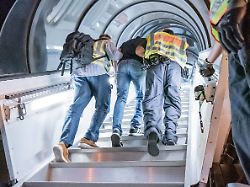The traffic light coalition is trying to show its ability to act with the new law on deportations. For her standards, she brings the package across the preliminary finish line almost silently. In doing so, she also gives in to demands from the Union. But she continues to put pressure on her.
This morning, CDU General Secretary Carsten Linnemann is merciless: The traffic lights are doing “nothing” against migration, he complains on ZDF. 50 days have passed since Chancellor Olaf Scholz offered a pact for Germany. “Nothing” happened. Linnemann was also appointed to his position because he can hit the table so well verbally. He also speaks with the tailwind from two election victories, in Hesse and Bavaria, and rising poll numbers in the federal government.
The Union is trying to push the government ahead of itself. The topic of migration is ideal for this. It is a merciless exaggeration that the government is doing nothing to limit immigration. It has introduced border controls at the borders with Switzerland, Poland and the Czech Republic, negotiated a new asylum system called GEAS at the European level, is working on repatriation agreements with several countries and Chancellor Olaf Scholz just said in “Spiegel” that now it is finally happening on a large scale must be deported. And yet she can hardly shake the label “too little, too late”.
Interior Minister Nancy Faeser didn’t seem rushed this morning when she presented the new deportation law. Your company took some time with the topic. The federal government and the states had already agreed to adopt these measures on May 10th. The state now has more powers to deport people without the right to remain. The SPD politician has said several times that the law shows how well the coalition is working together. This is probably an attempt to counteract the bad mood towards the traffic lights.
No epic battles
At least: This question actually went without much of a row – despite the highly emotional topic. This time too, a few SPD and Green politicians from the second tier complained, but there were no epic traffic light battles like in the spring over the heating law and in the late summer over basic child welfare.
This could also be because this package is unlikely to have any major consequences. As ntv learned from the Ministry of the Interior, it is very difficult to assess the consequences of the measures. The bill cautiously states that the number of deportations will increase by 600. If things go well, maybe 1,500. That’s an increase of five to ten percent compared to the previous two years, when 12,000 deportations were successful. This year alone, more than 230,000 asylum applications have been submitted – a good half of which were approved.
Is this supposed to be the grand style that Scholz announced? Hardly likely. The larger style would only be possible if more countries were declared safe countries of origin and more return agreements were concluded with home countries. But such a sweeping attack would certainly have caused more strife within their own ranks. So the coalition once again offered the Union a target for attack, even though the day would have had the potential to lead to a forward flight.
But not much else could have been expected. In fact, repatriations are not the key to getting immigration under control. According to current figures from the Federal Ministry of the Interior, 255,000 people in Germany are currently required to leave the country. Of these, 205,000 are tolerated and only 50,000 actually have to leave. There are quite a few, but little will change in the overall situation. The problems with accommodation, school and daycare and integration courses remain.
Then there is the Germany Pact
Faeser tries to make the small litter seem a little bigger. She puts it in the context of other traffic light laws: the opportunity residence law, which makes it possible to get the right to stay if you know German and have a job. In addition, there is the new law on skilled immigration, which opens up legal routes to Germany. And finally, the citizenship law, which finally enables dual citizenship and makes it easier to get a German passport.
And what will happen to the Germany pact on migration? Scholz has just written a letter to CDU leader Friedrich Merz in which he vaguely promises him cooperation. Merz recently handed Scholz 26 demands at a dinner. These include an expanded list of safe countries of origin, establishing return centers, restricting family reunification and defining an upper limit for admission.
All of this is difficult fare for parts of the SPD and the Greens, who still have federal party conferences ahead of them at the end of November and beginning of December. A stricter migration policy will lead to heated discussions there. So Scholz has little leeway. Meanwhile, the Union’s attacks are likely to continue. Because there are European elections next June. If the number of refugees does not fall by then, it would be great conditions for the AfD and the Wagenknecht party – and continued high immigration would also affect the Merz party. Seen this way, the traffic lights and the Union have a common interest. Whether they recognize it is another question.
